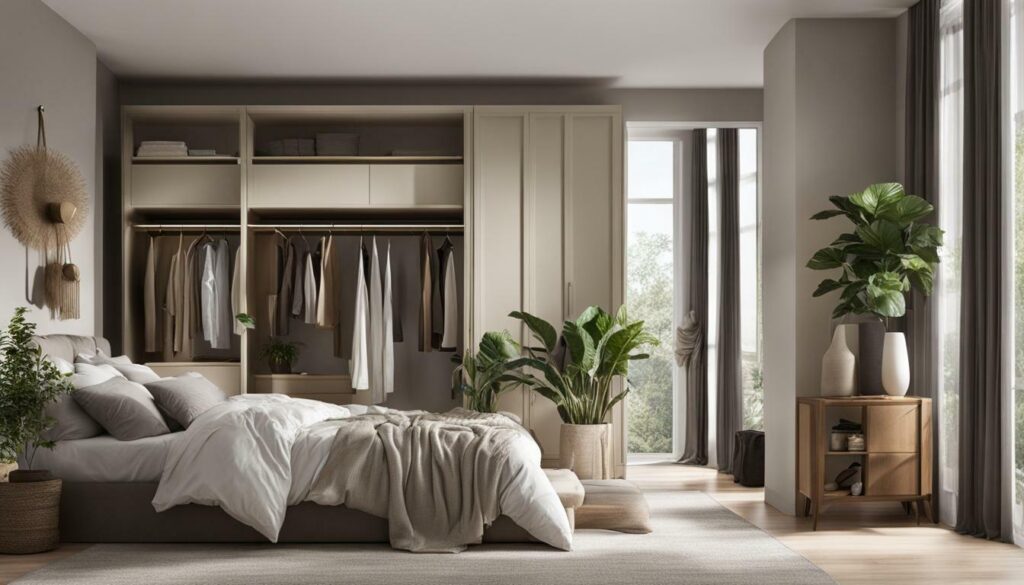Embracing simplicity and minimalism in organization can transform your cluttered spaces into peaceful havens. By adopting minimalist organization principles, you can create a more fulfilling life that values what is essential and removes distractions. Minimalism offers a fresh approach to organizing your home, your schedule, and even your digital spaces. It is a lifestyle that promotes simplicity, mindfulness, and intentional living.
- Minimalist organization principles can lead to a more fulfilling and stress-free life.
- Decluttering your home is the first step toward minimalist organization.
- Shopping less and choosing quality over quantity can help maintain a minimalist lifestyle.
- Simplifying your schedule and prioritizing meaningful activities can bring more balance and joy to your life.
- Decluttering your digital spaces can promote a clear mind and reduce distractions.
By embracing intentional living, mindful consumption, and gratitude, you can find purpose and meaning beyond material possessions. With these principles in mind, you can embark on a journey towards a simpler, more organized, and more fulfilling life.
The Benefits of Minimalist Organization
By embracing minimalist organization principles, you can experience less stress, increased efficiency, and a greater sense of fulfillment in your daily life. Minimalism is not just about having a tidy space; it is a lifestyle that values what is essential and removes distractions. By decluttering your home, simplifying your schedule, and adopting intentional and mindful practices, you can create a space and a life that is focused on what truly matters.
- Reduced stress: Clutter and excess possessions can contribute to feelings of being overwhelmed and anxious. Adopting minimalist organization principles allows you to create a calm and peaceful environment, promoting a sense of tranquility and reducing stress.
- Increased efficiency: When your physical and digital spaces are organized and clutter-free, you can spend less time searching for things and more time focusing on tasks and activities that are important to you. Minimalism helps streamline your life, allowing you to be more productive and efficient.
- A greater sense of fulfillment: By prioritizing what truly brings you joy and aligns with your values, minimalism helps you create a life that is filled with purpose and meaning. It encourages you to let go of material possessions that no longer serve you and instead focus on experiences, relationships, and personal growth.
“Minimalism is the intentional promotion of the things we most value and the removal of anything that distracts us from it.” – Joshua Becker
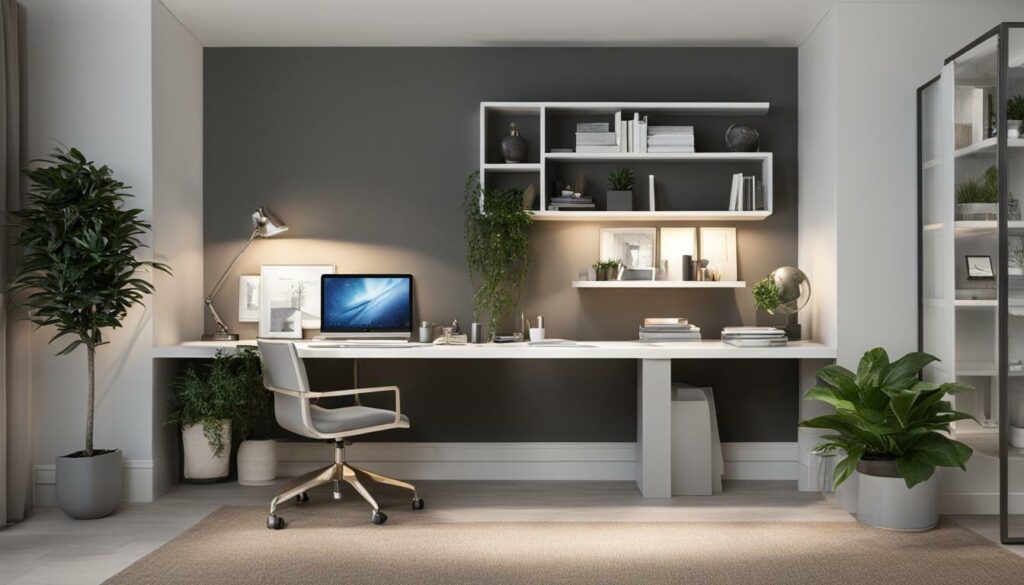
| Principle | Description |
|---|---|
| Decluttering your home | Remove unnecessary belongings, create a clean and organized space |
| Shopping less, choosing quality | Focus on quality over quantity, make intentional purchasing decisions |
| Simplifying your schedule | Organize your time, prioritize meaningful activities |
| Creating a timeless wardrobe | Curate a versatile wardrobe with quality pieces |
| Decluttering your digital spaces | Organize digital files, minimize distractions |
| Embracing intentional living | Be mindful of what you bring into your life |
| Mindful consumption | Make intentional and sustainable purchasing decisions |
| Practicing gratitude | Find purpose and meaning beyond material possessions |
By embracing minimalist organization, you can create a space and a life that is focused on what truly matters. Start by decluttering your home, simplifying your schedule, and adopting intentional practices. Remember, minimalism is not about perfection but rather about finding joy and fulfillment in a simpler and more meaningful way of living.
Declutter Your Home: The First Step to Minimalist Organization
Decluttering your home is essential to create a clean and organized space that aligns with minimalist organization principles. By removing the excess and focusing on what truly matters, you can cultivate a sense of simplicity and calm in your living environment. When your home is free from clutter, it becomes easier to find things, maintain cleanliness, and experience a greater sense of peace and clarity.
Start by tackling one area of your home at a time. Begin with spaces that tend to accumulate the most clutter, such as closets, drawers, and countertops. Sort through your belongings and ask yourself whether each item brings you joy, serves a purpose, or holds sentimental value. Be honest with yourself and let go of things that no longer align with your values or contribute to your well-being.
One effective strategy is the KonMari method, developed by organizing consultant Marie Kondo. This approach encourages you to keep only items that spark joy. As you declutter, create separate piles for things you want to donate, sell, or discard. This process not only helps you simplify your home but also allows you to practice gratitude for the items that have served their purpose in your life.
| Benefits of Decluttering Your Home |
|---|
| 1. Increased productivity: A clutter-free space fosters focus and productivity by eliminating distractions. |
| 2. Reduced stress: Clutter can create mental and physical stress. Decluttering promotes a sense of calm and relaxation. |
| 3. Better organization: With fewer items to manage, organizing and maintaining a tidy home becomes easier. |
| 4. Improved well-being: Living in a clean and clutter-free environment can have a positive impact on your mental and emotional well-being. |
Remember, decluttering your home is a journey, not a one-time task. It requires ongoing effort and a commitment to living a minimalist lifestyle. But as you embrace simplicity and let go of the unnecessary, you’ll create space for the things that truly matter, allowing you to live a more intentional and fulfilling life.
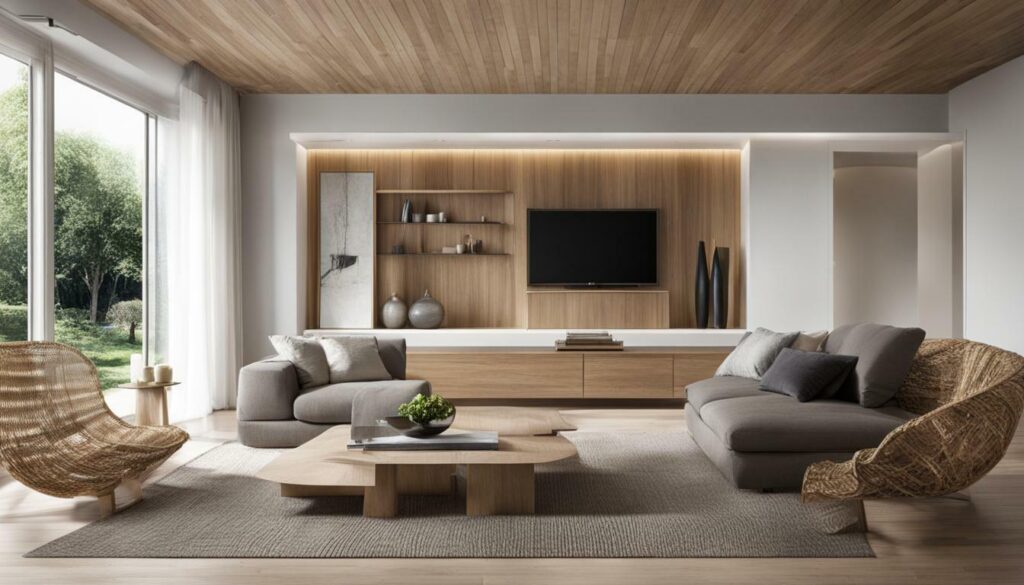
Embracing minimalist organization principles means shifting your mindset towards shopping, focusing on quality over quantity. Adopting a minimalist approach can lead to more intentional and satisfying purchases when it comes to shopping for necessities and wants. By making thoughtful choices and being mindful of what you bring into your life, you can create a clutter-free environment and a more fulfilling lifestyle.
To shop less and choose quality, start by evaluating your needs versus wants. Ask yourself if a particular item aligns with your values and if it will genuinely enhance your life. Instead of buying items on impulse, take a step back and give yourself time to consider if it’s a necessary purchase. This practice can help prevent impulse buying and reduce the accumulation of unnecessary items.
“The things you own end up owning you.” – Joshua Fields Millburn
Another essential aspect of minimalist shopping is focusing on quality. Instead of buying cheap, disposable items, invest in high-quality products that are built to last. Take the time to research brands and materials, opting for sustainable and ethically made goods whenever possible. While this may mean spending more upfront, you’ll save money in the long run by avoiding frequent replacements.
| Minimalist Shopping Checklist |
|---|
| 1. Evaluate needs versus wants |
| 2. Take time to consider purchases |
| 3. Prioritize quality over quantity |
| 4. Research brands and materials |
| 5. Opt for sustainable and ethically made products |
By implementing these minimalist organization tips for shopping, you can minimize clutter, reduce waste, and cultivate a more intentional relationship with your belongings. Remember, the goal is not to completely eliminate shopping from your life but to make conscious and deliberate choices that align with your values and contribute to a simpler and more meaningful life.
Simplify Your Schedule for a Minimalist Lifestyle
A minimalist lifestyle involves simplifying your schedule to prioritize activities that align with your values and bring you joy. By embracing simplicity in your daily routine, you can experience a greater sense of fulfillment and harmony in your life. Here are some organization tips to help you simplify your schedule and create a more minimalist lifestyle:
- Identify your priorities: Take the time to reflect on what truly matters to you. Determine your core values and prioritize activities that align with those values. This will help you make conscious choices about how you spend your time and energy.
- Eliminate non-essential tasks: Evaluate your current commitments and identify any tasks or responsibilities that do not contribute to your overall well-being or happiness. Letting go of these non-essential tasks will free up valuable time for activities that bring you joy.
- Create a routine: Establishing a daily or weekly routine can help bring structure and stability to your life. By allocating specific time slots for different activities, you can ensure that you have dedicated time for work, self-care, relationships, and personal growth.
- Say no more often: Learn to set boundaries and say no to commitments or obligations that do not align with your values or bring you joy. It’s okay to prioritize your own well-being and decline opportunities that may distract you from what truly matters.
Remember, minimalism is not about filling every moment of your schedule or being busy all the time. It’s about consciously choosing how you spend your time and focusing on what brings you the most fulfillment. By simplifying your schedule, you can create more space for meaningful experiences and a greater sense of balance in your life.

Create a Timeless Wardrobe: Minimalist Organization Tips for Clothing
Adopting minimalist organization principles for your clothing means curating a timeless wardrobe filled with high-quality, versatile pieces. It’s about embracing simplicity and valuing quality over quantity. By decluttering your closet and investing in items that truly resonate with your personal style, you can create a wardrobe that brings you joy and stands the test of time.
When decluttering your clothes, take a minimalist approach by asking yourself if each item truly serves a purpose in your life. Keep only the pieces that you love and feel confident wearing. Let go of items that no longer fit, are outdated, or don’t align with your current style. By doing so, you’ll create space for new pieces that truly reflect who you are.
Investing in high-quality, timeless pieces is key to building a minimalist wardrobe. Choose well-made garments that are durable and versatile, allowing you to mix and match them effortlessly. Opt for neutral colors and classic silhouettes that stand the test of time. These timeless pieces will become the foundation of your wardrobe and can be easily dressed up or down for any occasion.
| Key Tips for Creating a Timeless Wardrobe: |
|---|
| 1. Invest in quality over quantity |
| 2. Choose versatile, neutral pieces |
| 3. Prioritize comfort and fit |
| 4. Practice the “one in, one out” rule |
| 5. Take care of your clothes and mend them when needed |
Remember, a minimalist wardrobe doesn’t have to be boring. Accessories can be your best friends when it comes to adding variety to your outfits. Invest in a few statement accessories that can transform the simplest of outfits. By curating a timeless wardrobe filled with pieces that you truly love, you’ll not only simplify your mornings but also feel more confident and stylish every day.
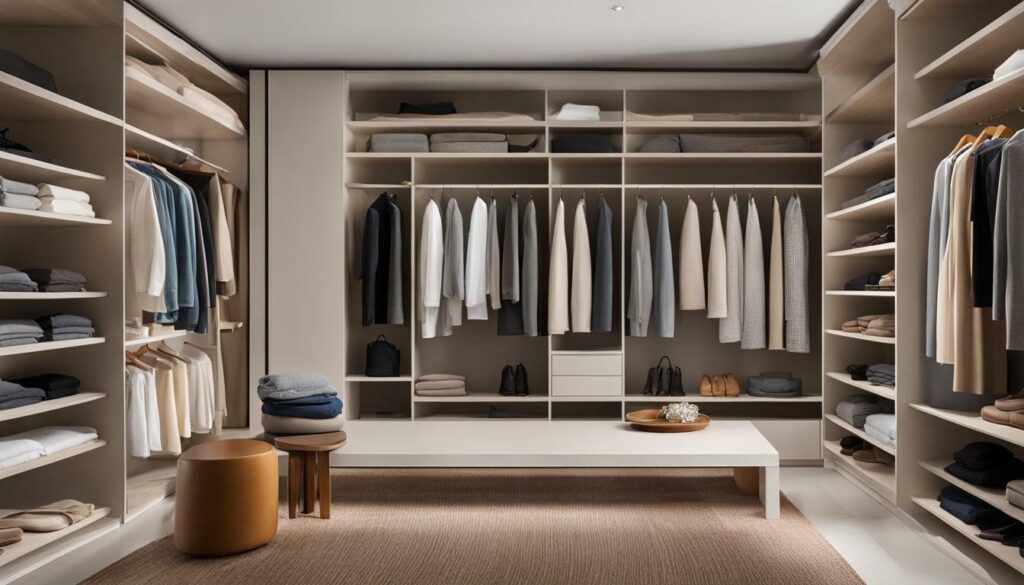
“Simplicity is the ultimate sophistication.” – Leonardo da Vinci
Declutter Your Digital Spaces: Minimalist Organization Tips for a Clear Mind
In today’s digital age, decluttering your online spaces is crucial for maintaining a minimalist mindset and achieving mental clarity. Our digital devices have become an integral part of our lives, but the constant influx of information and notifications can easily overwhelm and distract us. By organizing and streamlining your digital spaces, you can create a sense of calm and focus amidst the digital chaos.
Start by decluttering your computer files and organizing them into folders. This will make it easier to find what you need and ensure that your desktop is clean and clutter-free. Delete any unnecessary files and archive important documents to free up space and reduce visual clutter.
“The first step in crafting a digital minimalism mindset is to declutter your digital spaces. It’s about consciously deciding what information and digital tools you allow into your life, and eliminating the rest.” – Minimalist Living Expert
Next, tackle your smartphone by removing apps that you no longer use or need. Organize your apps into folders based on their category or function to create a more streamlined and efficient home screen. Turn off unnecessary notifications to minimize distractions and create a calmer digital environment.
Decluttering Tips for a Clear Mind:
- Regularly delete and unsubscribe from email newsletters that no longer serve you.
- Use browser extensions to block ads and minimize distractions while browsing the internet.
- Organize your bookmarks and remove any that are no longer relevant.
In conclusion, decluttering your digital spaces is an essential part of practicing minimalist organization. By simplifying and decluttering your online life, you create a clear and focused mindset that allows you to make intentional choices and prioritize what truly matters. Embrace these minimalist organization tips to achieve mental clarity and a more fulfilling digital experience.
Embrace Intentional Living: A Key Principle of Minimalist Organization
Intentional living is a fundamental principle of minimalist organization, guiding us to be more conscious of our choices and actions. By intentionally evaluating the things we bring into our lives, we can create a more meaningful and fulfilling existence. When it comes to organization, intentional living encourages us to prioritize what truly matters, declutter what no longer serves us, and focus on what brings us joy.
One way to embrace intentional living is through mindful consumption. Instead of mindlessly accumulating possessions, we can make deliberate and sustainable choices. By adopting a minimalist approach to shopping, we can reduce our environmental impact and create a clutter-free living space. Choosing quality over quantity, investing in timeless pieces, and considering the longevity of our purchases are key aspects of intentional living.
Another aspect of intentional living is decluttering our digital spaces. In today’s digital age, our devices and online platforms can easily become overwhelming and distracting. By organizing our digital files, minimizing notifications, and creating a serene digital environment, we can promote clarity of mind and focus on what truly matters. As Marie Kondo wisely said, “Tidying is just a tool, not the final destination. The true goal should be to establish the lifestyle you want most once your tidying is done.”
| Benefits of Embracing Intentional Living: |
|---|
| Reduces stress and overwhelm |
| Creates a clutter-free living space |
| Promotes clarity of mind |
| Helps prioritize what truly matters |
| Fosters a more meaningful and fulfilling life |
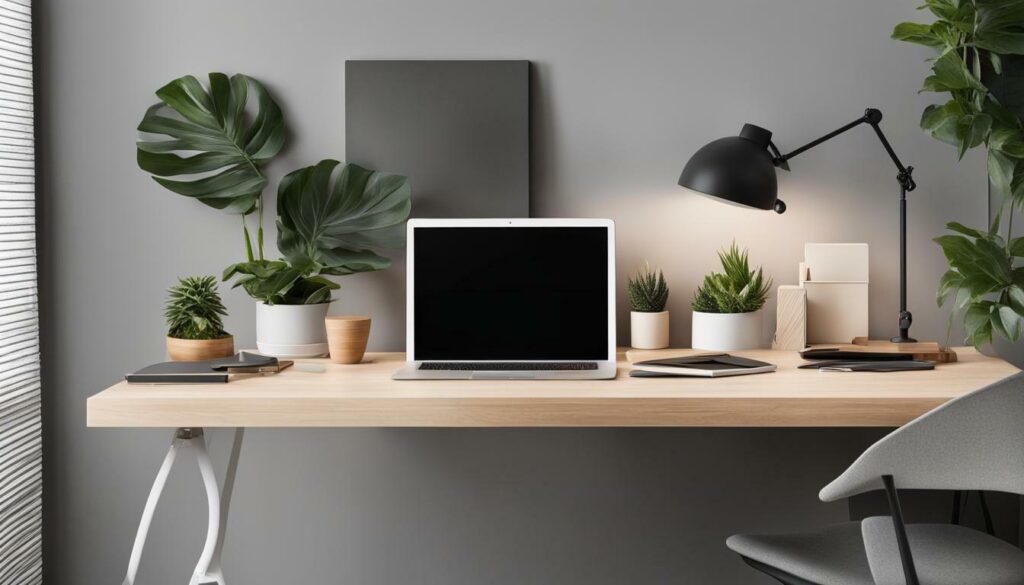
In conclusion, intentional living is a powerful principle that can transform our approach to organization. By embracing intentional living, practicing mindful consumption, and simplifying our digital spaces, we can create a more fulfilling and clutter-free life. Remember, minimalism is not about deprivation but about valuing what is essential and removing distractions. Embrace intentional living, and you will discover the joy of living with purpose and meaning.
Mindful Consumption: Minimalist Organization Tips for Shopping
Mindful consumption is an essential aspect of minimalist organization, encouraging us to be intentional and mindful when making purchasing decisions. It involves being aware of our buying habits, considering the impact of our choices on the environment and our well-being, and valuing quality over quantity. By adopting mindful consumption practices, we can reduce waste, save money, and cultivate a more sustainable and minimalist lifestyle.
One effective tip for mindful shopping is to create a list before heading to the store or making an online purchase. This helps us focus on what we truly need, preventing impulse buys and unnecessary clutter. By sticking to our list, we can avoid the temptation of acquiring unessential items and make more conscious choices.

Another helpful strategy is to research and understand the true value of the items we are considering. This involves evaluating the quality, durability, and longevity of products before making a purchase. By investing in well-made, long-lasting items, we reduce the need for constant replacements and contribute to a more sustainable lifestyle.
| Benefits of Mindful Consumption | Minimalist Organization Principles |
|---|---|
| Fosters a more sustainable lifestyle | Encourages intentional and mindful decisions |
| Reduces waste and promotes environmental responsibility | Prioritizes quality over quantity |
| Saves money in the long run | Minimizes unnecessary clutter |
“By adopting mindful consumption practices, we can reduce waste, save money, and cultivate a more sustainable and minimalist lifestyle.”
Lastly, let’s practice gratitude for what we already have rather than constantly seeking more. Before making a purchase, ask yourself if the item is truly necessary and if it aligns with your values and needs. By shifting our mindset from always wanting more to appreciating what we already own, we can break free from the cycle of mindless consumption and find contentment in the present moment.
In conclusion, mindful consumption is a key principle of minimalist organization that encourages intentional and mindful shopping. By creating lists, researching product value, and practicing gratitude, we can make more conscious purchasing decisions and contribute to a more sustainable and fulfilling lifestyle.
Gratitude and Minimalist Organization: Finding Purpose and Meaning
Gratitude plays a significant role in minimalist organization, helping us find purpose and meaning beyond the accumulation of material possessions. When we practice gratitude, we shift our focus from what we lack to what we have, and this shift in perspective can transform our lives.
By expressing gratitude for the things we already own, we become more aware of their value and significance. We develop a deeper appreciation for the essentials and are less tempted to chase after unnecessary stuff. This shift in mindset allows us to let go of the excess and create space for what truly matters.
Gratitude also helps us prioritize experiences and relationships over material possessions. It encourages us to engage with the present moment and find joy in the simple things. When we are grateful, we are more likely to make conscious choices that align with our values and bring us closer to our goals.

The Power of Gratitude
Practicing gratitude not only enhances our well-being but it also contributes to a healthier environment. When we are grateful for what we have, we are less inclined to constantly acquire new things, resulting in less waste and a more sustainable lifestyle. Gratitude reminds us to cherish and care for the resources we already possess.
| Benefits of Gratitude in Minimalist Organization |
|---|
| Shifts focus from accumulation to appreciation |
| Helps prioritize experiences and relationships |
| Promotes conscious choices aligned with values |
| Reduces waste and supports sustainability |
Embracing gratitude as part of our minimalist organization journey empowers us to live with intention and purpose. It reminds us that true fulfillment lies not in the abundance of possessions but in the richness of our experiences and connections. By cultivating gratitude, we can create a more meaningful and purposeful life.
Minimalist Hacks for Everyday Life
Incorporating minimalist hacks into your daily routine can simplify your life and enhance your overall well-being. By adopting these practical strategies, you can create a more organized and intentional lifestyle. Whether you’re looking to declutter your home, streamline your schedule, or make sustainable choices, these minimalist tips will help you achieve your goals.
1. Declutter Your Space
Start by decluttering your home and creating an environment that promotes calmness and clarity. Remove items that no longer serve a purpose or bring you joy. Donate or sell them to minimize clutter and make space for what truly matters. A clutter-free space can have a positive impact on your mental well-being and allow you to focus on the essentials.
2. Practice Essentialism
Embrace the idea of essentialism by focusing on what is truly important in your life. Cut out unnecessary commitments and prioritize activities that align with your values. Streamline your schedule by saying no to tasks and events that don’t bring you joy or contribute to your overall well-being. By simplifying your commitments, you can create more time and energy for activities that bring you fulfillment.
3. Choose Quality Over Quantity
When it comes to shopping, adopt a minimalist mindset by opting for quality over quantity. Invest in timeless pieces that will last for years rather than constantly buying cheap and disposable items. By choosing quality over quantity, you not only reduce clutter but also support sustainable practices and minimize your environmental impact.
| Key Benefits of Minimalist Hacks |
|---|
| Reduction in stress levels |
| Increase in productivity and focus |
| Enhanced clarity and mental well-being |
| Promotion of intentional living |
“Simplicity is the ultimate sophistication.” – Leonardo da Vinci
By embracing minimalist hacks and incorporating them into your daily life, you can experience the numerous benefits they offer. Reduction in stress levels, increased productivity, enhanced mental well-being, and the promotion of intentional living are just some of the advantages of leading a minimalist lifestyle. So why not give it a try and see how simplicity can transform your life?
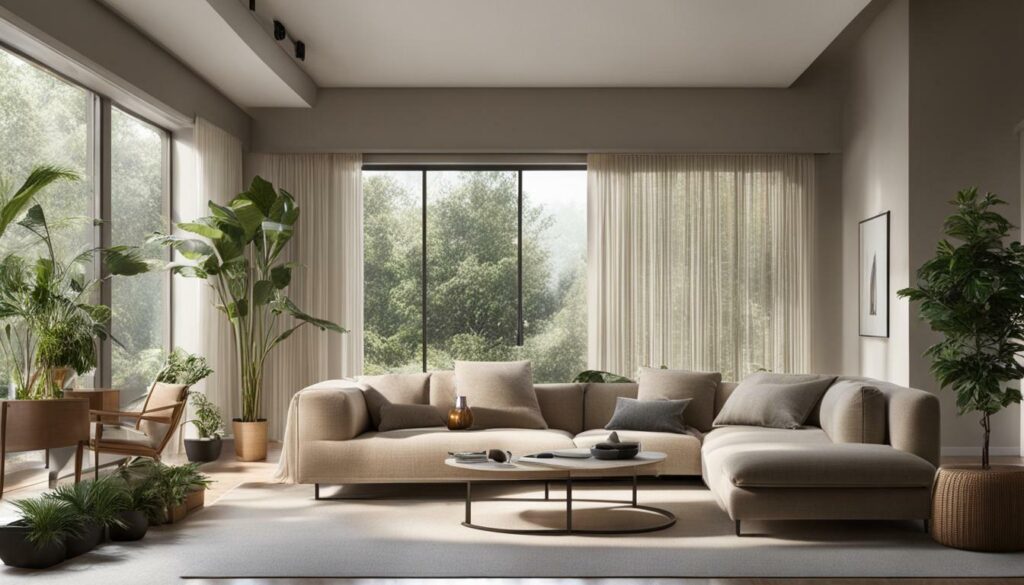
Minimalist organization principles can be successfully applied in a family setting, creating an organized and harmonious home. By adopting these principles, families can reduce clutter, streamline daily routines, and create a calm and inviting environment for all members. Here are some practical tips to help your family embrace minimalist organization:
- Declutter together: Set aside dedicated time as a family to declutter and organize your home. Encourage everyone to go through their belongings and keep only what is essential and brings them joy. This process will not only create more physical space but also promote a sense of responsibility and mindfulness about the things we own.
- Create designated spaces: Assign specific areas for different items, such as toys, books, and clothing. Use storage solutions like baskets, shelves, and labeled bins to keep everything organized and easily accessible. By giving everything a designated place, it becomes easier for family members to put things back where they belong, reducing clutter and saving time.
- Practice regular maintenance: Implement a daily or weekly routine where the whole family participates in tidying up and putting things back in their designated spaces. This habit will help maintain an organized home and prevent future clutter from accumulating. Encourage children to take responsibility for their own belongings and teach them the importance of cleanliness and order.
Remember, minimalism is not about depriving yourself or your family of things, but rather valuing what is essential and removing distractions. By embracing minimalist organization principles, families can create a space that nurtures creativity, fosters meaningful connections, and promotes a sense of calm in their everyday lives.
| Tips for Minimalist Organization | Benefits |
|---|---|
| Declutter together | Teaches responsibility and mindfulness |
| Create designated spaces | Promotes easy access and reduces clutter |
| Practice regular maintenance | Maintains an organized and stress-free environment |
Minimalist Organization at Work: Streamline Your Workspace
Applying minimalist organization principles at work can enhance your productivity and create a more streamlined and efficient workspace. By decluttering your physical and digital spaces, you can eliminate distractions and focus on tasks that truly matter. A clean and organized workspace promotes clarity of thought and allows you to work more easily and effectively.
Start by removing any unnecessary items from your desk, keeping only the essentials within reach. Use organizers or drawer dividers to keep your supplies and documents neatly arranged. Create a designated space for each item, making it easier to find what you need when you need it. Remember, a clutter-free environment promotes a clear mind and reduces stress.
When it comes to your digital workspace, decluttering your computer files and email inbox is essential. Create folders and subfolders to categorize your files and use descriptive names for easy retrieval. Set up rules or filters to automatically sort incoming emails into specific folders, reducing inbox clutter. Unsubscribe from irrelevant email lists and delete old or unnecessary messages. A well-organized digital workspace allows you to locate files quickly and minimizes distractions.
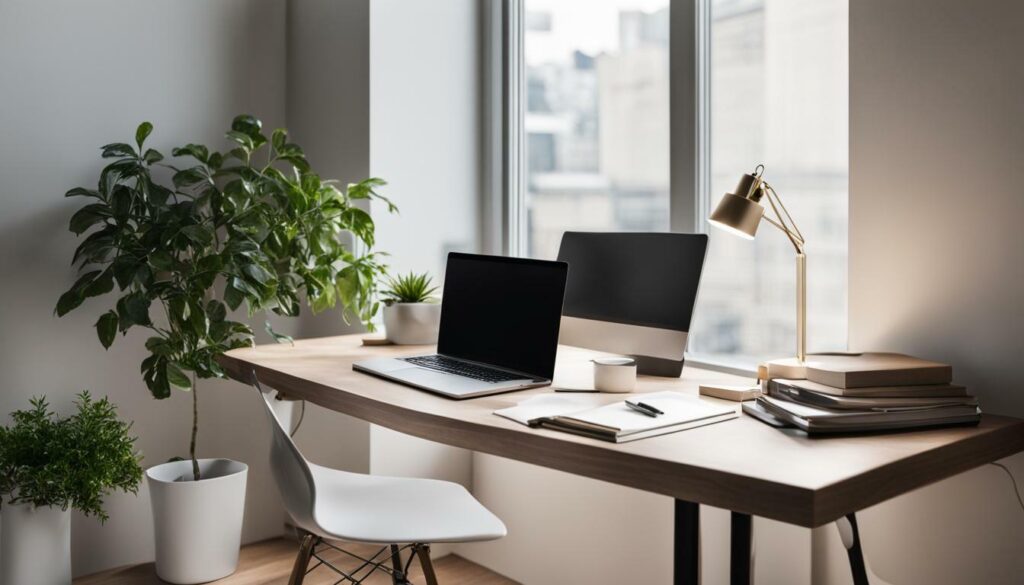
Create a Minimalist Workspace:
- Clear your desk of unnecessary items, keeping only the essentials.
- Use organizers or drawer dividers to keep supplies and documents neatly arranged.
- Create folders and subfolders to categorize digital files for easy retrieval.
- Set up rules or filters to automatically sort emails into specific folders.
- Unsubscribe from irrelevant email lists and delete old or unnecessary messages.
Streamlining your workspace and reducing clutter can optimize your focus and productivity. Embracing minimalist organization principles at work allows you to create an environment that supports your goals and enhances your overall efficiency. So, take a few moments to declutter and organize your workspace today and experience the benefits of a minimalist approach to work.
Minimalism and Sustainability: A Powerful Combination
Minimalism and sustainability go hand in hand, as adopting minimalist organization principles promotes conscious consumption and reduces environmental impact. By simplifying our lives and focusing on what truly matters, we can make more intentional choices that benefit both ourselves and the planet.
One of the key aspects of minimalism is decluttering our homes and living spaces. This not only creates a sense of calm and order, but it also reduces the need for excessive consumption. When we have fewer belongings, we are less likely to buy things we don’t truly need, which leads to less waste and a smaller carbon footprint.

To further embrace sustainability in our minimalist lifestyle, we can prioritize quality over quantity. By investing in well-made, durable products, we reduce the need for constant replacements and contribute to a more circular economy. Choosing items made from sustainable materials and produced ethically also aligns with our values of living a simple and mindful life.
In conclusion, minimalism and sustainability are a powerful combination that can transform our lives and the world around us. By adopting minimalist organization principles, we not only create a more organized and fulfilling life for ourselves, but we also contribute to a more sustainable and eco-friendly future. Let’s embrace simplicity, value what is essential, and make conscious choices that bring joy and purpose to our lives.
The Journey to Minimalist Organization: Overcoming Challenges
The path to minimalist organization may present challenges, but with determination and a positive mindset, you can overcome them and experience the transformative power of minimalism. The principles of minimalism, such as decluttering, simplifying, and embracing intentional living, can lead to a more fulfilling and purposeful life. However, it’s important to acknowledge that the journey towards minimalist organization is not always a smooth one.
One of the main challenges people face when adopting minimalist organization principles is letting go of sentimental items or possessions with emotional attachments. It can be difficult to part with belongings that hold memories or sentimental value. In such cases, it can be helpful to remind yourself of the benefits of minimalism and the freedom that comes with letting go. Focus on the joy and peace that can be gained by decluttering and creating space for what truly brings you happiness.
Another challenge is overcoming the urge to constantly acquire new things. In a consumer-driven society, we are bombarded with advertisements and messages that encourage us to buy more. It takes discipline to resist the temptation and choose quality over quantity. Practice mindful consumption by asking yourself if something truly adds value to your life before making a purchase. By adopting a more intentional approach to shopping, you can avoid the accumulation of unnecessary items and cultivate a more minimalist lifestyle.
Overcoming Challenges: Practical Tips
- Start small: Begin your minimalist journey by tackling one area of your life at a time. Whether it’s decluttering your closet, organizing your digital files, or simplifying your schedule, focusing on one aspect allows you to make progress without feeling overwhelmed.
- Set clear goals: Define your vision of minimalism and what it means to you. Set specific goals and create a plan to achieve them. Having a clear vision and actionable steps will help you stay motivated and focused.
- Embrace the process: Minimalism is not a destination; it’s a lifestyle. Embrace the process of simplifying and organizing, and be patient with yourself. It’s okay if you stumble along the way. Remember that each step towards minimalism brings you closer to a more meaningful and fulfilling life.

In conclusion, the journey to minimalist organization may have its challenges, but the rewards are worth it. By decluttering, simplifying, and embracing intentional living, you can create a space that promotes peace, clarity, and fulfillment. Remember to be patient with yourself, celebrate your progress, and stay committed to the principles of minimalism. With determination and a positive mindset, you can overcome any obstacles and experience the transformative power of minimalism in your life.
Embrace Minimalist Organization for Simplicity and Joy
Embracing minimalist organization principles enables you to simplify your life, prioritize what brings you joy, and find fulfillment in a clutter-free and organized environment. By applying the principles of minimalism, such as decluttering your home, shopping mindfully, and simplifying your schedule, you can create a space that promotes calmness and clarity.
When you declutter your home, you remove unnecessary physical possessions, creating a more spacious and serene living space. This process allows you to let go of items that no longer serve a purpose, freeing up mental and physical energy for what truly matters. By adopting a minimalist approach to shopping, focusing on quality over quantity, you can curate a wardrobe and belongings that are timeless and essential, reducing decision fatigue and promoting a sense of intentionality.
The minimalist organization extends beyond physical spaces to encompass your digital life as well. Clearing out the digital clutter on your devices and organizing your digital files can create a sense of mental clarity and focus. By simplifying your schedule and prioritizing activities that align with your values and goals, you can make more time and space for meaningful experiences and connections.
Embracing intentional living, mindful consumption, and gratitude are key aspects of minimalist organization. By being aware of the things you bring into your life, making intentional and sustainable choices, and expressing gratitude for what you have, you can find purpose and meaning beyond material possessions. Minimalism allows you to let go of what no longer serves you and focus on what truly matters, leading to a simpler, more fulfilling life.



